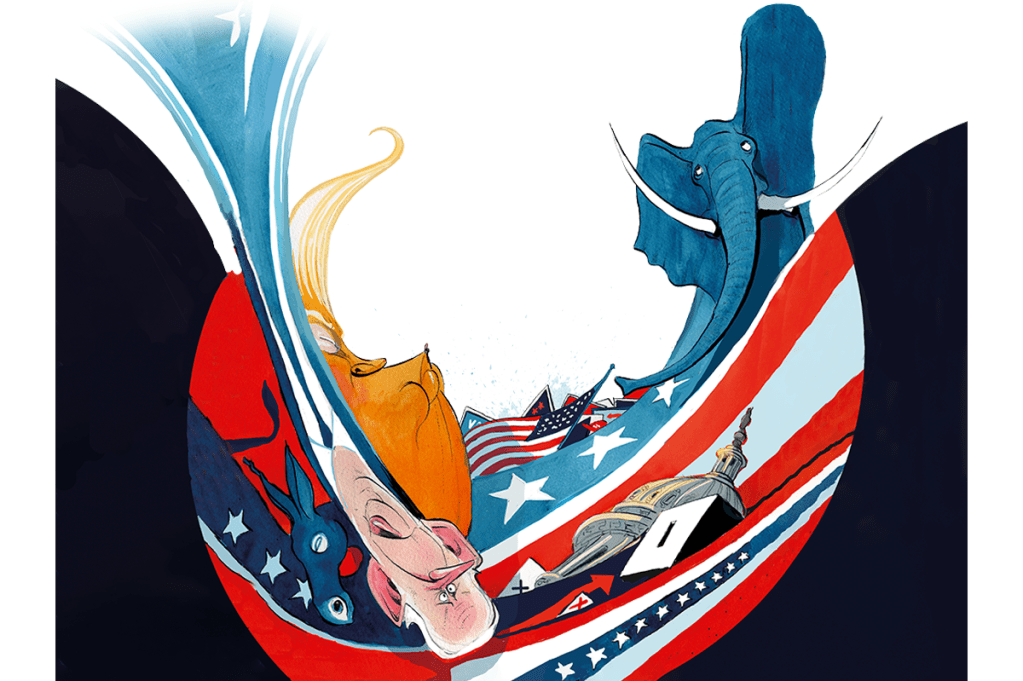Since Tuesday’s shocking midterm results started trickling in, the chattering classes have scrambled to make sense of yet another election we forecast so very poorly. The media promised a red wave of epic proportions; instead, President Biden had the best midterm elections of any US president since 2002, despite his dreadful approval ratings.
In the lead-up to the vote count, poll after poll found that Americans’ top issues were inflation, the economy, crime and immigration — kitchen table issues on which the Democrats have performed abysmally in recent years. Everything pointed to a very bad night for the president’s party. So why didn’t voters send a clear message to Democrats about their misplaced priorities, as we in the media were so sure they would?
In the efforts to explain the refusal of the electorate to obey the diktak of media prognosticators, a few storylines have already taken hold.
Some have argued that the Democrats’ success is proof of how important abortion is to the American electorate. In the wake of the Dobbs decision earlier this year, which revoked abortion as a constitutional right, many who might have been tempted to swing rightwards resisted, voting instead for the party whose candidates weren’t threatening to ban abortion at six or twelve weeks, or suggesting the government had a role in that decision at all.
For others, the election was a referendum on Trump; his endorsees did especially poorly, with proximity to the former president being one of the best predictors of whether a Republican tanked. Still others have seen in the results proof that candidate choice matters; you can’t just run a kooky Stop the Steal candidate or an out-of-state TV doctor and expect voters to turn out for him because he’s running on the Republican ticket.
There’s a bit of truth to all of these answers. But I don’t think they don’t add up to an especially satisfactory answer as to what happened on Tuesday. For these midterm results were less a loss for Republicans or a win for Democrats than they were a victory for depolarization. Americans showing up to the polls voted less for Democrats or against Republicans than they did for shrinking the growing gap that separates them.
Call it the normie election. The people who decided Tuesday’s results were everyday Americans sick of the overheated political atmosphere that’s bleeding out into everyday life. People who don’t spend all day on Twitter or watching cable news or YouTube shows, who are sick of Facebook fights and Thanksgiving family brawls and just want a return to normal, to the good old days when you could just debate things cordially.
There are a lot of these Americans. Talk to any middle- or working-class American about politics and at some point they are likely to tell you how fed up they are with how contentious everything has become. Though we are told incessantly how polarized we are, the truth is that Americans don’t hate each other; they hate the political parties — both political parties. Anthony Fowler, a professor of public policy at the University of Chicago, has found in study after study that Americans tend to be much more moderate than their politicians, much less polarized and much more intolerant of intolerance than the people elected to represent them.
“To be sure, there are real policy disagreements among Americans,” writes Fowler. “But for every extreme liberal or conservative who agrees with their party on most issues, there are far more people in the middle who think that Nancy Pelosi is too far to the left and that Mitch McConnell is too far to the right.”
This is what we saw in many of Tuesday’s big wins, during which voters rewarded moderation above all. Democrats performed better close races than in safe seats, outperforming expectations in districts rated as “toss up” or “lean Democrat” and underperforming in districts rated as “solid” or “safe,” as David Schor pointed out. And as Josh Krausahar notes, voters who told pollsters they “somewhat disapprove” of Biden backed “normie” Republicans while rejecting the MAGA candidates. They went for Brian Kemp over Stacey Abrams but rejected Herschel Walker in Georgia, for example.
In race after race, voters rewarded candidates who represented the most reasonable version of their ticket. They went for candidates who they could picture — perhaps candidates they had seen — talking to someone they disagreed with. Victories were handed to members of both parties who projected with their records, their campaigns, their demeanor or their rhetoric a willingness to straddle that divide that is so alienating to so many Americans.
Consider one of the most significant wins of the election, Mike Lawler’s, who ousted no less a figure than the head of the Democratic Congressional Campaign Committee, Representative Sean Patrick Maloney, and won New York’s 17th district. Lawler had a number of things going for him, including $6 million from a Republican super PAC and some helpful redistricting. But he also ran a moderate campaign pitched at appealing to both the blue-collar cops, firefighters and veterans in his district, as well as wealthy liberals in Rockland County and Chappaqua. Lawler, a son of Rockland County, ran on crime, the economy and the border — issues that unite blue-collar workers across party lines. Crucially, he distanced himself from the Stop the Steal movement, making it clear he believes Joe Biden won the 2020 election.
When asked about how he managed to pull off his victory, Lawler pointed to the fact that his district still has 70,000 more Democrats in it than Republicans. “In order to win this district, I needed to go everywhere and talk to everyone,” he told CNN. “And I can’t be afraid because maybe there’s some tough questions that come.”
It was a victory for a man who made clear he was not going to be a tailwind for the most extreme forces in his party, who was unashamed of the fact that he was working to convince Democrats that he could represent them, too — indeed, he was proud of it.
Contrast that with Charlie Crist, the man who lost to Governor Ron DeSantis in a humiliating double-digit defeat, who bragged to a reporter during the campaign that he didn’t want Republicans to vote for him. “Those who support [DeSantis] should stay with him and vote for him and I don’t want your vote,” Crist said. “If you have that hate in your heart, keep it there. I want the vote of the people of Florida who care about our state”
It’s quite the campaign strategy to suggest that anyone you haven’t convinced to vote for you should just keep it that way. No wonder Crist lost so significantly. Floridians took his advice!
Indeed, DeSantis’s double-digit victory seems to have been fueled not by Republicans but by a lot of people who still identify as Democrats, who felt that the governor’s message appealed to them. In particular, DeSantis made big gains among working-class Hispanic voters, perhaps one of the few remaining sectors of the American population who are real swing voters. Though the liberal media has done its best to cast DeSantis as an extremist, his record and his messaging are much more focused at the vast middle, with views on abortion, education, and Covid that reflect a great American middle. And of course, he’s no favorite of former President Trump.
In a similar vein, both Elissa Slotkin and Abigail Spanberger won reelection, in Michigan’s 7th district and Virginia’s 7th district respectively. The two are both blue-dog Democrats, proud moderates with backgrounds in the CIA who won in red districts. Both Spanberger and Slotkin stand proudly for an independence of spirit, making a habit of taking on their own party, publicly rebuking progressives for extremism when warranted. And both were endorsed by former congresswoman Liz Cheney, one of the few Republicans to take on Donald Trump publicly.
“Tonight, voters here made clear that the politics of division are not what they want for our families or our state,” Slotkin wrote on Twitter in announcing that her challenger, Tom Barrett, had called to concede.
Moderation may not be the first word that comes to mind when thinking of John Fetterman, who won his Pennsylvania contest for Senate against Mehmet Oz. He has a progressive record on a range of issues. But Fetterman won despite suffering a debilitating stroke during the campaign with what the Hill’s Al Weaver aptly called “a ‘go anywhere’ strategy that focused on competing in rural counties across the state and holding the party line in the cities and suburbs.” And he did it all in shorts, a hoodie and visible tattoos, actively reversing the damage Hillary Clinton had done to her party by spurning those very same rural areas in 2016.
Far from diminishing his appeal, the stroke that Fetterman suffered perhaps made him seem even more like the everyman he dressed as. Bald, overweight and now sometimes verbally impaired, he was someone voters could never imagine looking down on them, unlike the millionaire with I-don’t-even-know-how-many-houses-I-own lecturing them about what to eat on television.
To me, it seems like Fetterman’s commitment to speaking to people who don’t agree with him, to dressing like people whose lives are very different from the privileged one he was blessed with, to being in every way the opposite of the elitism that plagues the progressive left these days, went a long way toward ensuring his victory. Voters rewarded him for his humility with their loyalty.
Even abortion was less a win for Democrats than it was for the kind of libertarian “don’t tread on me” undercurrent of American life. As Richard Hanania pointed out, the issue of abortion outperformed the Democrats running on it by a very wide margin wherever it was on the ballot. In Michigan, an amendment to put the right to an abortion in the state’s constitution passed with two points more than Democratic governor Gretchen Whitmer won by. In California, a similar amendment passed seven points ahead of Gavin Newsom. In Vermont, it was between six and fifteen points ahead of the Democrats running in each race. In Kentucky, a pro-life ballot failed in a race Rand Paul won by twenty-three points. And in Montana, an anti-abortion measure looks like it will fail — with the same electorate that gave one of its Republican candidates a thirty-five-point margin of victory.
In other words, many, many Americans who did not vote for Democrats voted to keep abortion legal. Like the ticket-splitting that happened in a number of races, this speaks well for a return to a less-polarized society that chooses issues and candidates with more flexibility and open-mindedness that you might think.
Meanwhile, as many have pointed out, the promised threats to democracy posed by MAGA candidates refusing to concede never materialized; things proceeded calmly, in an orderly fashion, with concessions from practically every candidate who has lost his or her race, on both the left and the right (kudos, Stacey Abrams!).
In other words, the biggest loser of Tuesday’s midterms wasn’t Trump or the Republicans so much as it was polarization itself, the division of Americans into two irreconcilable parties with competing sets of values that never shall meet. The biggest loser was the “I don’t want your vote” faction of the political class.
Polarization has always been a myth created by elites in the media, in tech and in politics to make millions and consolidate power. But this week, the American people went into the ballot box and said, “no more.”


















